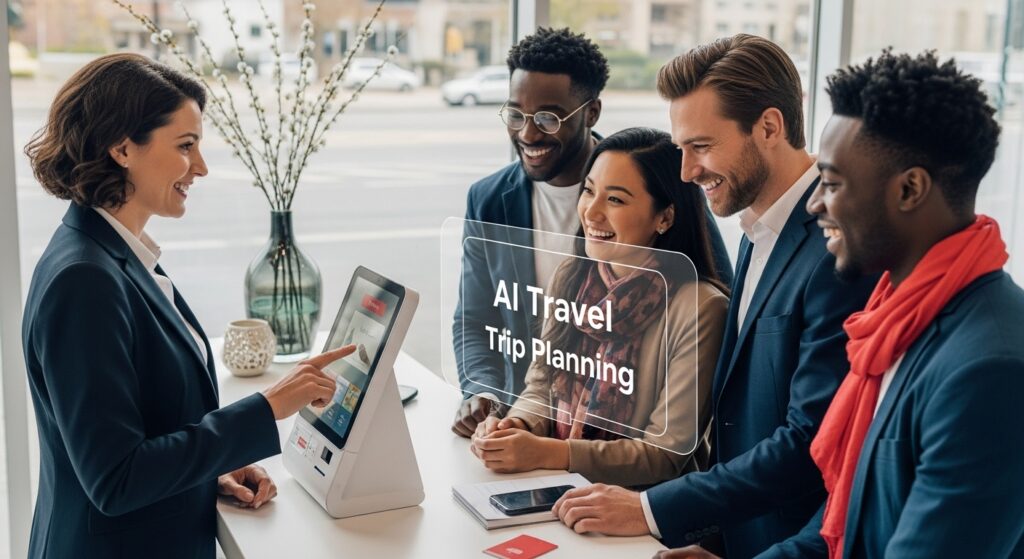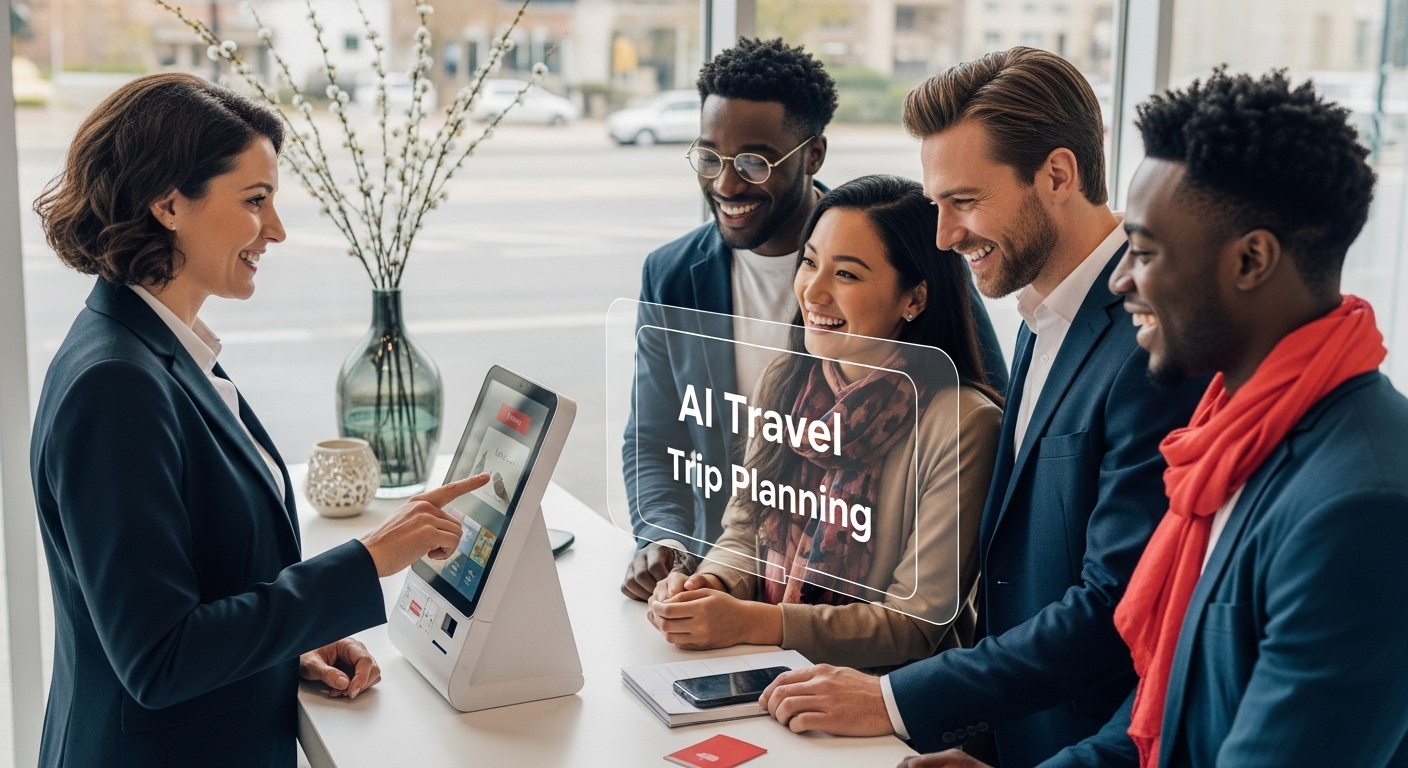AI travel is turning the old way of trip planning upside down and travelers are taking notice. Imagine skipping hours of research because algorithms can scan millions of data points almost instantly to create your perfect itinerary. Most people expect futuristic tech to be confusing or cold, but these smart systems actually feel more personal than any travel agent ever could and get better at understanding you every time you plan.
Table of Contents
- What Is AI Travel And How Does It Function?
- The Importance Of AI In Travel Planning
- Key Technologies Behind AI Travel Solutions
- Real-World Applications Of AI Travel Tools
- Future Trends In AI Travel And Their Impact
Quick Summary
| Takeaway | Explanation |
|---|---|
| AI travel personalizes your journey | AI systems analyze preferences and historical data to create tailored travel experiences. |
| Instant recommendations streamline planning | AI tools provide quick, data-driven suggestions that adapt in real-time to traveler needs. |
| Complexity of planning becomes manageable | AI breaks down intricate travel challenges, making trip organization simpler and less time-consuming. |
| Predictive analytics enhance decision-making | Advanced algorithms forecast potential travel disruptions and suggest adjustments accordingly. |
| Ethical considerations are crucial for AI | Future AI travel tools must prioritize data protection and algorithmic fairness to build trust. |
What is AI Travel and How Does It Function?
AI travel represents a groundbreaking technological approach that transforms traditional trip planning through intelligent, data-driven solutions. At its core, AI travel leverages advanced machine learning algorithms and vast datasets to create personalized, optimized travel experiences that adapt in real time to travelers’ preferences and constraints.
To provide a clearer understanding of how AI-powered travel solutions differ from traditional planning, the table below highlights the key differences between these two approaches.
| Aspect | Traditional Travel Planning | AI-Powered Travel Planning |
|---|---|---|
| Research Process | Manual comparison of options, time-consuming | Automated analysis of millions of data points instantly |
| Personalization | Limited, often generic | Highly personalized using traveler preferences and history |
| Adaptiveness | Static, requires manual updates | Dynamic, adapts in real time to user input and market changes |
| Support & Recommendations | Relies on human agents, limited hours | AI chatbots and systems available 24/7, constant suggestions |
| Handling Complexity | Can be overwhelming and fragmented | Simplifies complex itineraries, integrates all elements seamlessly |
The Intelligence Behind AI Travel
Traditional travel planning often involves hours of manual research, comparing options, and piecing together complex itineraries. AI travel disrupts this process by using sophisticated computational techniques that analyze millions of data points instantly. These intelligent systems can process traveler preferences, historical travel data, real-time pricing information, and contextual factors to generate highly customized recommendations.
According to research in the International Journal of Hospitality Management, AI applications in travel function through several key technological mechanisms:
- Predictive modeling that anticipates traveler needs
- Machine learning algorithms that improve recommendations over time
- Natural language processing enabling conversational interactions
- Complex data analysis across multiple travel service platforms
How AI Travel Systems Generate Personalized Experiences
AI travel systems work by creating intricate digital profiles that capture nuanced traveler preferences. These systems consider multiple factors beyond basic demographics, including:
- Past travel history
- Specific destination interests
- Budget constraints
- Preferred travel styles
- Seasonal availability
By integrating these sophisticated data points, our guide on AI travel itinerary planning demonstrates how modern platforms can generate hyper-personalized recommendations that feel remarkably human-like and intuitive.
The technology continuously learns and refines its understanding, making each subsequent recommendation more precise and tailored to individual travelers.
The Importance of AI in Travel Planning
AI has emerged as a transformative force in travel planning, offering unprecedented capabilities that dramatically improve how travelers research, design, and experience their journeys. By integrating advanced computational technologies, AI eliminates traditional barriers that once made trip planning complex, time-consuming, and often frustrating.
Solving Complex Travel Planning Challenges
Traditional travel planning involves numerous challenges that can overwhelm even experienced travelers. These challenges include navigating countless online resources, comparing intricate pricing structures, understanding destination-specific nuances, and creating optimal itineraries that balance preferences with practical constraints. AI technologies systematically deconstruct these complexities, providing intelligent solutions that make travel planning more accessible and enjoyable.

According to research from the RAND Corporation, AI-driven travel tools can significantly enhance user experience through several key mechanisms:
- Instantaneous information processing across multiple platforms
- Personalized recommendations based on individual traveler profiles
- Real-time price and availability tracking
- Predictive analysis for potential travel disruptions
Empowering Travelers with Intelligent Insights
AI travel planning goes beyond simple recommendation engines. These sophisticated systems provide comprehensive insights that transform how travelers conceptualize and execute their trips. By analyzing vast datasets, AI can identify travel patterns, suggest unexpected destinations, and create itineraries that align perfectly with individual preferences.
Moreover, our comprehensive guide on transforming travel journeys illustrates how AI technologies can:
- Minimize travel planning stress
- Optimize budget allocation
- Discover unique experiences tailored to personal interests
- Provide adaptive recommendations that evolve with changing travel trends
The true power of AI in travel planning lies in its ability to democratize sophisticated trip design, making expert-level planning accessible to every traveler regardless of their experience or background.
Key Technologies Behind AI Travel Solutions
AI travel solutions leverage an intricate ecosystem of advanced technologies that work in concert to transform how travelers plan and experience their journeys. These sophisticated technological frameworks combine multiple computational approaches to create intelligent, adaptive travel planning systems that go far beyond traditional booking platforms.
Machine Learning and Predictive Analytics
At the heart of AI travel solutions are machine learning algorithms that continuously analyze massive datasets to generate intelligent recommendations. These algorithms process complex information from multiple sources, including historical travel data, user preferences, real-time pricing, and contextual factors. Machine learning enables systems to understand patterns that human planners might overlook, creating increasingly precise and personalized travel suggestions.
According to research from MIT and the MIT-IBM Watson AI Lab, advanced AI travel technologies now incorporate sophisticated frameworks that translate user preferences into executable planning strategies. These systems use:
- Large language models for natural interaction
- Formal verification tools for logical planning
- Satisfiability modulo theories (SMT) solvers for constraint resolution
- Adaptive recommendation engines
Integrative Technologies and Data Processing
Modern AI travel solutions represent a complex technological ecosystem that integrates multiple advanced technologies. Natural language processing enables conversational interactions, while big data analytics provide the computational muscle for processing vast amounts of information instantaneously. Our comprehensive guide on AI trip planning demonstrates how these technologies work together to create seamless, intelligent travel experiences.

The core technologies powering these solutions include:
- Advanced neural network architectures
- Real-time data integration platforms
- Intelligent API management systems
- Contextual recommendation algorithms
By combining these sophisticated technologies, AI travel solutions can now offer unprecedented levels of personalization, efficiency, and insight that fundamentally reimagine the travel planning experience.
This table organizes the primary technologies supporting AI travel solutions along with their main functions, helping readers quickly grasp the technological framework powering modern AI-assisted trip planning.
| Technology | Main Function | Example Application |
|---|---|---|
| Machine Learning | Analyzes large datasets for pattern recognition and prediction | Personalizing itineraries based on past behavior |
| Natural Language Processing (NLP) | Enables conversational interactions and understands user input | AI-powered chatbots for customer service |
| Big Data Analytics | Processes massive amounts of travel data instantly | Real-time price and availability tracking |
| Neural Networks | Powers complex reasoning and recommendations | Suggesting optimal travel routes |
| API Integrations | Combines multiple data sources seamlessly | Merging hotel, flight, and activity info into one itinerary |
Real-World Applications of AI Travel Tools
AI travel tools have transitioned from theoretical concepts to practical solutions that are actively transforming how travelers plan, experience, and manage their journeys. These innovative technologies are no longer futuristic predictions but real-world systems that solve complex travel challenges across multiple domains.
Personalized Travel Planning and Recommendations
AI travel tools excel at creating hyper-personalized travel experiences by analyzing individual preferences, historical data, and contextual information. These intelligent systems go beyond generic recommendations, generating customized itineraries that consider nuanced factors like personal interests, budget constraints, travel style, and even individual comfort levels.
According to research from the MIT-IBM Watson AI Lab, advanced AI travel technologies can now translate user preferences into executable planning strategies through sophisticated computational frameworks. Practical applications include:
- Generating precise, personalized travel itineraries
- Recommending destinations based on individual preferences
- Identifying cost-effective travel options
- Predicting potential travel disruptions
Intelligent Customer Service and Support
AI technologies are revolutionizing customer interactions in the travel industry by providing instantaneous, intelligent support across multiple platforms. Chatbots and virtual assistants powered by natural language processing can handle complex queries, provide real-time information, and offer personalized recommendations without human intervention.
Our comprehensive guide on transforming travel journeys illustrates how AI tools can:
- Answer traveler queries instantly
- Provide multilingual customer support
- Offer 24/7 assistance
- Resolve common travel-related problems efficiently
These AI-driven solutions are not just technological novelties but practical tools that significantly enhance the overall travel experience by providing immediate, intelligent, and personalized support.
Future Trends in AI Travel and Their Impact
AI travel technologies are rapidly evolving, promising transformative changes in how travelers interact with transportation, planning, and exploration. These emerging trends are not just incremental improvements but fundamental reimaginings of the travel experience that will reshape entire industry paradigms.
Hyper-Personalization and Predictive Travel
The future of AI travel centers on creating unprecedented levels of personalization that anticipate traveler needs before they are even articulated. Advanced machine learning algorithms will generate predictive travel experiences that adapt in real time to individual preferences, environmental conditions, and unexpected circumstances.
According to research from the University of South Florida, emerging AI travel technologies will dramatically transform traveler interactions by:
- Creating dynamically adjusting itineraries
- Providing contextual recommendations based on real-time data
- Predicting potential travel complications
- Offering personalized risk assessments
Ethical AI and Technological Challenges
The next generation of AI travel tools will prioritize transparency and user trust. As these technologies become more sophisticated, addressing concerns about data privacy, algorithmic bias, and technological reliability becomes paramount. Travelers increasingly demand systems that not only provide convenience but also demonstrate ethical computational practices.
Our comprehensive guide on transforming travel journeys highlights the critical considerations for future AI travel development:
- Implementing robust data protection mechanisms
- Creating explainable AI systems
- Developing algorithms that respect cultural diversity
- Ensuring fair and unbiased recommendation engines
These technological advancements represent more than incremental improvements they signal a fundamental reimagining of travel as an intelligent, adaptive, and deeply personalized experience.
Experience Stress-Free AI Travel Planning with Yopki
You have just learned how AI travel is changing the way people design journeys by making trip planning quicker, more personal, and less overwhelming. Still, facing endless tabs, confusing routes, and the uncertainty of making the best choices can take the fun out of planning your dream vacation. Yopki is designed to solve these exact pain points. Our all-in-one platform uses the same AI-driven personalization and smart itinerary features you read about. With Yopki, you get instant recommendations, a visual map to organize every day, and a drag-and-drop itinerary that adapts to your needs. Say goodbye to spreadsheets and endless research. Learn how AI can transform your trip planning then see it in action on Yopki.

Ready to start planning your vacation without the usual stress and uncertainty? Sign up today at Yopki and let your AI Travel Concierge handle everything so you can focus on enjoying the journey. Try it now and experience travel planning made truly simple.
Frequently Asked Questions
What is AI travel and how does it function?
AI travel leverages advanced machine learning algorithms and data-driven solutions to create personalized and optimized travel experiences, making trip planning more efficient.
How do AI travel systems generate personalized travel recommendations?
AI travel systems analyze various data points, including past travel history, budget constraints, and travelers’ preferences, to create customized itineraries that feel intuitive and personally tailored.
What technologies support AI in travel planning?
AI travel solutions utilize machine learning, natural language processing, and big data analytics to provide intelligent, adaptive recommendations, ensuring a seamless travel planning experience.
What are the benefits of using AI tools for travel planning?
AI tools help minimize planning stress by providing real-time price comparisons, personalized insights, predictive analysis on travel disruptions, and overall, a more streamlined and enjoyable trip planning process.



